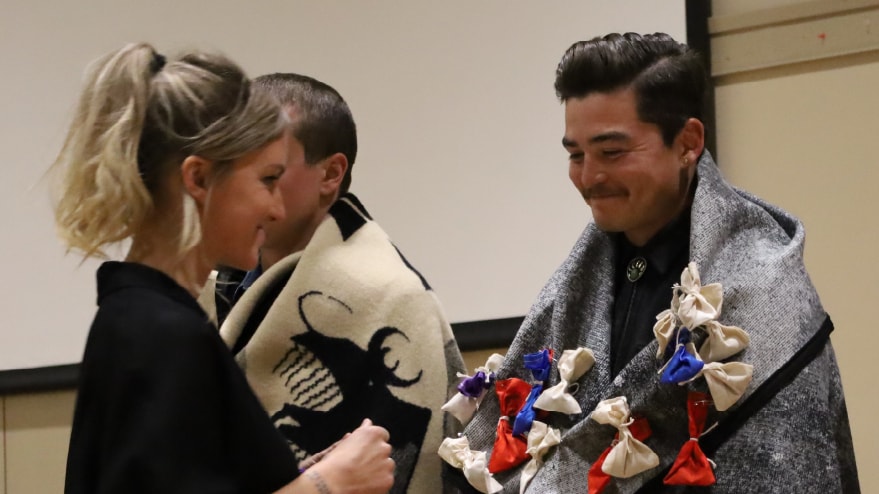{{item.title}}
{{item.text}}

{{item.text}}
Khoi Mai, Senior Manager, Indigenous Markets Lead, PwC Canada
“Though I’m not Indigenous, being embraced by these communities drives me to learn, grow, and collaborate—proving that no matter where you come from, you have the power to make a difference.”
Statistically speaking, I probably shouldn’t be where I am today. Given my socio-economic background and the conditions I grew up in, it’s been a bit of a fight to make it this far. But with a lot of help, I kept pushing, and now, at PwC Canada, I have an amazing opportunity to advocate for other people too.
I grew up in a low-income neighbourhood in Portland, Oregon, in a Vietnamese immigrant community. My father was a boat person, and at the time they met, my mother was a social worker for the United Nations. They met in a refugee camp in Hong Kong and later emigrated to the United States, where I was born.
At age 18, I came to Canada to play rugby at the University of British Columbia. My plan was to play as much as possible and then join the US Marines, as that seemed like my best opportunity for success at the time. Whether by luck or fate, one of my professors took an interest and urged me to continue my studies. With his guidance and support, I was able to complete my undergraduate degree in forest resource management and began a thesis-based master’s degree.
To support myself through university, I worked as a professional fishing guide in Haida Gwaii, British Columbia. Many of my clients were executives of prominent forestry companies. Through speaking with them, and from other work I was doing in remote rural areas, I became interested in relationships between Indigenous communities and the forestry industry. I wondered what factors led to successful relationships for both groups, and that question became the topic of my master’s thesis. Over the next several years, I spent a lot of time talking to all parties involved to understand and answer this question, and I’m proud to say I recently successfully defended my thesis and completed my graduate degree.
Over the past four years, my work at PwC Canada in the Deals Capital Projects and Infrastructure practice and now as our firm’s Indigenous Markets Lead has given me a chance to use a lot of the skills and understanding I’ve developed through my personal life and my schooling. For example, in 2021, I led the Indigenous engagement efforts in the province-wide BC flood recovery mandate. This role allowed me to develop meaningful relationships with many of the Indigenous communities affected by the disaster. At the end of the project, some of the communities honoured me in a blanket ceremony, which is something I’ll cherish for the rest of my life.
I take part in ceremonies and cultural practices, such as sweats, winter dances and hunting game for the Elders. The communities I’ve worked with have a strong culture of inclusivity: I have found that in showing up with sincerity and seeking to understand and learn, I’ve been welcomed and offered teachings that have helped guide me in my own life journey. I don’t know why such patience and grace have been offered to me by members of these communities. It may be a mutual recognition of trauma experienced through colonization and war, or it may be a simple recognition of shared humanity. Regardless, I am very grateful for the teachings that have been offered.
l was recently invited to join the Indigenous Inclusion Network at PwC Canada. Because of my involvement with Indigenous communities, I’ve been able to help Indigenous and non-Indigenous members of our firm understand more about Indigenous cultures. For example, I was honoured to bring in several Elders to our Vancouver office to share some of their traditional practices. For the past year, I’ve also been part of the Indigenous Reconciliation Action Committee, which is focused on helping improve the lived experience of Indigenous community members within our firm, as well as those seeking employment and participation in corporate Canada.
I’m grateful for the support we’ve received from the Executive Leadership Team and the investments and commitments our firm has made to date, and I’m excited to continue these efforts in a sustained way.
I’ve been helped by so many people, and it’s their help that has enabled me to be where I am today. I firmly believe that with the right support, even if you’re from an underprivileged background, you can do anything you set your mind to. One thing I would encourage people to understand is that although it may not seem like it, no matter who you are or where you come from, you have the power to help improve the lives of those around you.
Khoi is PwC Canada’s Indigenous markets lead and a senior manager in our Deals Capital Projects and Infrastructure practice. He lives in British Columbia, on the unceded, ancestral territory of the Coast Salish Peoples.
{{item.text}}

{{item.text}}

